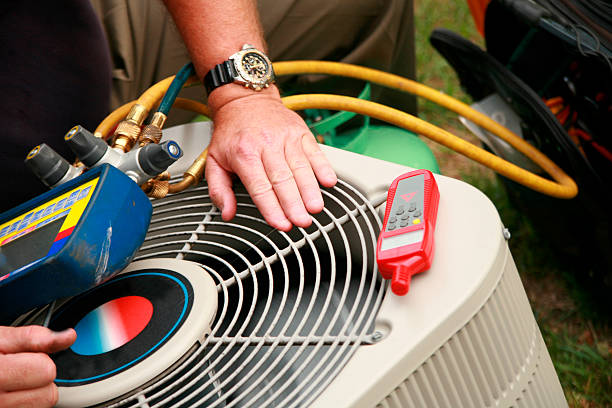How to Improve Energy Performance With Your HVAC System and Heating System Upgrades
As power expenses remain to rise, the value of enhancing power performance via a/c system and heater upgrades can not be overstated. Evaluating your present system's performance and considering energy-efficient alternatives are essential very first actions. Along with choosing designs with high SEER and AFUE scores, optimizing thermostat settings and improving insulation can dramatically impact total efficiency. However, the trip in the direction of making best use of power effectiveness does not finish there; recognizing the nuances of regular maintenance and its lasting advantages is similarly essential. What are the specific approaches that can result in considerable cost savings and improved comfort?
Examine Your Existing System
Before starting any kind of upgrades, it is important to analyze your existing HVAC system and heating system to understand their efficiency and performance. This first analysis supplies a foundation for identifying locations that call for improvement and informs choices concerning possible upgrades. Begin by examining the age of your heating and cooling system, as out-of-date models may lack modern-day energy-saving functions.

Power consumption documents will likewise be important in gauging your system's functional prices. Take into consideration conducting a professional power audit to receive a professional assessment of your system's performance.
Upgrade to Energy-Efficient Models
Updating to energy-efficient versions is a pivotal action in improving the general efficiency of your HVAC system and furnace. These contemporary devices are made to consume less power while supplying optimum heating and air conditioning, leading to significant expense savings on energy costs and a lowered environmental impact.
When taking into consideration an upgrade, seek models that have high Seasonal Energy Efficiency Ratios (SEER) for air conditioning and Annual Fuel Application Performance (AFUE) rankings for heating systems. These scores suggest the performance of the systems, with higher numbers showing far better performance. Energy-efficient versions often incorporate innovative technologies, such as variable-speed motors and clever thermostats, which further boost energy financial savings.
Additionally, lots of energy-efficient HVAC systems are furnished with enhanced insulation and much better securing, which reduce energy loss and improve indoor comfort. residential hvac company. While the initial financial investment might be greater, the long-term cost savings on energy costs and possible tax obligation rewards for making use of energy-efficient home appliances can counter this expense dramatically

Ultimately, updating to energy-efficient designs not just adds to an extra lasting future however also raises the comfort and performance of your home or company.
Optimize System Setups
To make best use of the efficiency of your A/c system and furnace, it is important to optimize system setups tailored to your certain demands. Start by establishing your thermostat to an energy-efficient temperature level.
Make use of programmable or smart thermostats that allow you to schedule temperature adjustments instantly. This guarantees your system runs just when needed, decreasing power intake. In addition, make sure that your system is readied to run in the correct setting-- heating in winter season and air conditioning in summer-- while staying clear of the constant fan alternative unless required for air flow.
On a regular basis evaluation and change settings based on seasonal changes, occupancy patterns, and specific comfort choices. Make sure that vents and signs up are unobstructed, enabling for ideal airflow. Lastly, consider zoning systems that enable customized comfort in different locations of your home, additionally boosting effectiveness. By fine-tuning these setups, you can attain considerable energy cost savings while keeping a comfortable living setting.
Improve Insulation and Sealing
A well-insulated home is crucial to taking full advantage of the effectiveness of your heating and cooling system and furnace. Appropriate insulation decreases the work on these systems, thus conserving power and lowering energy costs. Begin by evaluating your home's insulation in areas such as the attic room, wall surfaces, and floors. Insulation materials like fiberglass, foam, and cellulose can substantially improve thermal resistance, assisting my explanation to keep conditioned air inside and exterior air out.
Along with insulation, securing gaps and splits is important. Pay unique focus to home windows, doors, and any penetrations in wall surfaces, such as electric outlets and plumbing components. Weatherstripping and caulking can effectively secure these openings, preventing drafts that jeopardize your a/c effectiveness.
Furthermore, guarantee that air ducts are effectively shielded and secured. Leaking air ducts can cause considerable power losses, lowering system efficiency. Utilizing mastic sealant or metal tape to secure duct joints can enhance air movement and useful site efficiency.
Schedule Normal Upkeep
Regular upkeep of your A/c system and furnace is crucial for guaranteeing optimal efficiency and longevity. During upkeep, a certified service technician will clean and replace filters, check refrigerant levels, inspect ductwork for leakages, and evaluate total system operation.
It is suggested to arrange upkeep at least twice a year-- as soon as in the springtime for the cooling system and when in the succumb to the heating unit. furnace repair. Normal upkeep aids preserve constant indoor temperature levels, ensuring convenience throughout the year. Furthermore, a well-kept system operates much more efficiently, which can bring about recognizable decreases in power expenses
Ignoring upkeep can lead to reduced performance, boosted deterioration, and ultimately, system failing. By prioritizing regular solution, property owners can avoid unanticipated malfunctions and guarantee their heating and cooling system and heating system run at peak efficiency. Investing in maintenance is a critical action in boosting energy effectiveness and creating a more lasting home environment.
Conclusion
In verdict, improving power efficiency within cooling and heating systems and heater upgrades is crucial for decreasing power consumption and boosting general comfort. An organized technique that consists of assessing the current system, buying Full Article energy-efficient models, optimizing settings, enhancing insulation, and scheduling routine upkeep can lead to considerable advantages. Carrying out these techniques not only decreases power expenses but likewise adds to an extra lasting environment, making it essential for home owners to focus on these upgrades.